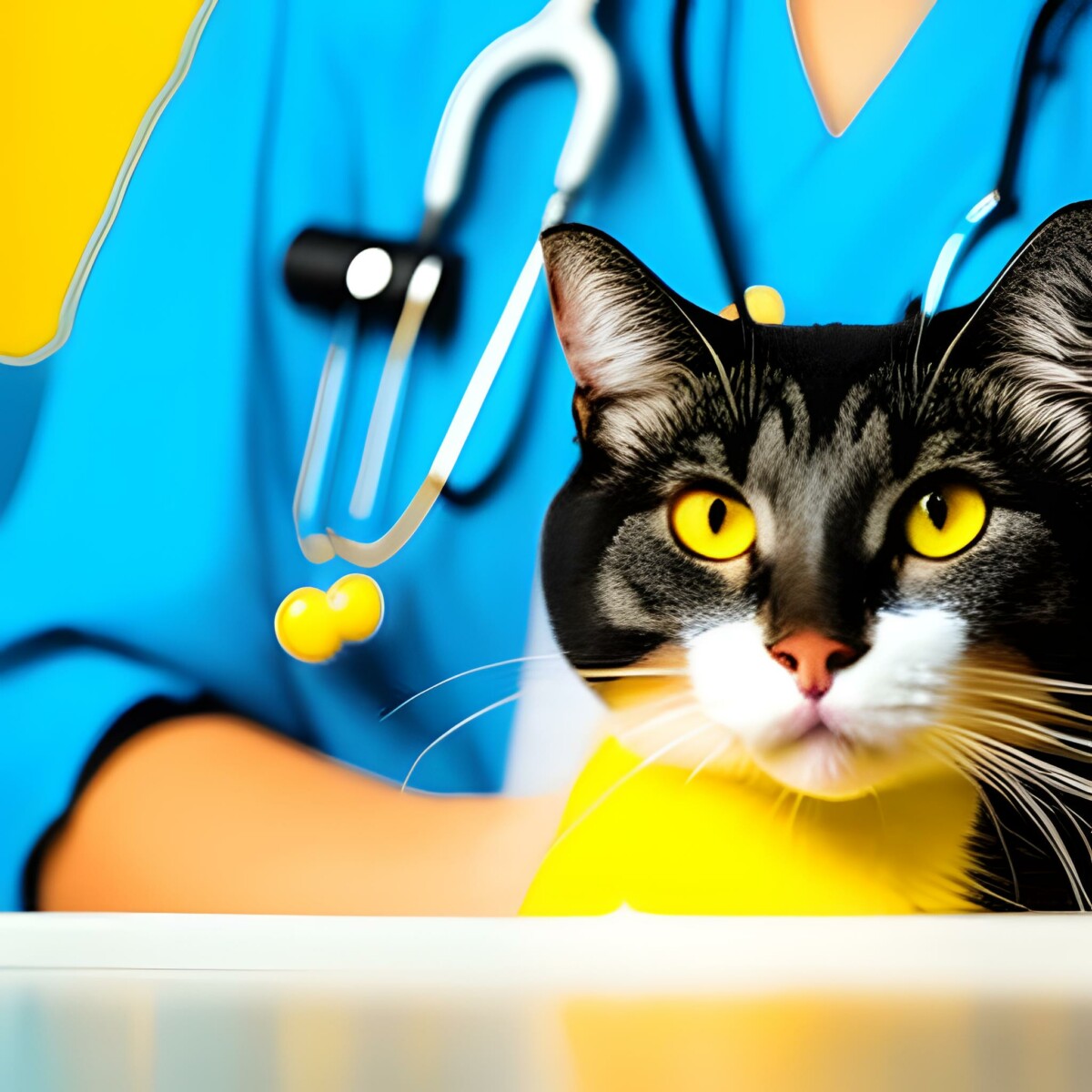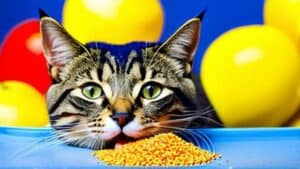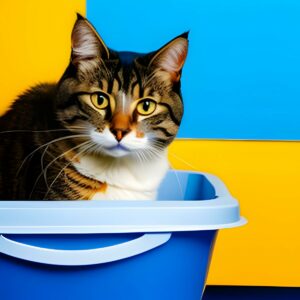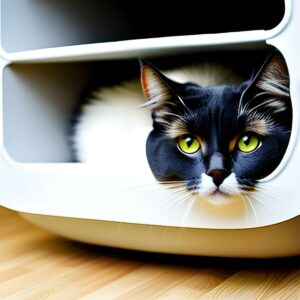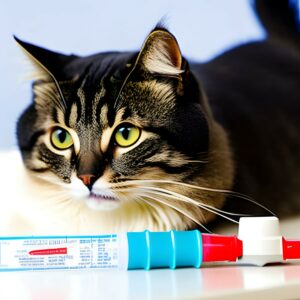They may not be able to speak our language, but senior cats can show early signs of health issues, so the best we can do is to learn how to understand.
Senior cat health issues can develop over time, but some can happen overnight and leave us hopeless. Signs of illness in cats sometimes require detective work to notice.
We gathered our team to create this comprehensive piece to help you understand symptoms, recognize when you need to take imidate action, and what to do about your senior cat’s health care to prevent serious issues.
😻
Senior Cat Health Issues: Table of Contents
1. Dental disease in senior cats 🦷
Dental diseases in senior cats are a common issue that we encounter.
There are three main types of dental diseases in cats:
- gingivitis,
- periodontitis,
- tooth resorption
Approximately two-thirds of cats over three years of age have some degree of dental disease, and the most common problems are due to periodontal disease, gingivitis, and cervical neck lesions, also called oral resorptive lesions.
Plaque is the most common cause of dental disease in cats. If plaque is not removed by regular brushing, it can harden over time due to calcium deposits and become dental tartar or calculus.
Dental disease in cats can cause serious pain and discomfort, which can impact a cat’s quality of life.
The symptoms of dental disease in senior cats may include:
- bad breath,
- difficulty eating,
- drooling,
- weight loss,
- bleeding gums,
- loose or missing teeth,
- decreased appetite, which could be caused by a decreased sense of smell, gum pain, or tooth pain.
The treatment plan for dental diseases in senior cats depends on the severity of the disease.
In some cases, regular dental cleanings and proper dental hygiene, such as daily brushing, can prevent dental diseases from developing or becoming more severe.
However, in severe cases, extractions or other dental procedures may be necessary.
2. Kidney disease in senior cats 🩺
Chronic kidney disease (CKD) is a common health issue in aging cats, affecting up to 44% of cats over 15 years old.
The causes of CKD in cats are not fully understood but may include genetics, age-related changes, and environmental factors.
The condition can lead to:
- Kidney failure results in a range of symptoms such as increased thirst and urination, loss of appetite, vomiting, weight loss, and lethargy.
- Anemia due to low red blood cell count,
- High blood pressure,
- Urinary tract infections (UTIs).
Treatments for CKD in senior cats may include:
- nutritional management,
- fluid therapy,
- medication to control blood pressure, and manage any related health issues
Nutritional management may include a low-protein, phosphorus-restricted diet to reduce the workload on the kidneys, and supplementation of omega-3 fatty acids to help reduce inflammation.
Early diagnosis and treatment are important for the management of CKD in senior cats, and regular check-ups and blood work are recommended to monitor the progression of the disease.
3. Heart disease in senior cats 💙
Common heart diseases in senior cats include:
- Acquired heart disease: can be secondary to other illnesses like high blood pressure, heartworm infection, thyroid disorders, or due to diseases of the heart valves or primary cardiomyopathy.
- Cardiomyopathy: is the most common form of heart disease seen in cats, and the most common cause of heart failure. In advanced stages of cardiomyopathy, there are two alarming signs that may occur in cats: the animal may struggle to take in air, or it may be unable to move its rear legs.
Symptoms of heart disease in cats include:
- difficulty breathing,
- coughing,
- panting ( rapid respiratory rate), especially after exercise or exertion.
- changes in appetite,
- weight loss,
- decreased energy levels
- lethargy,
- hindlimb paralysis
- hypertension or high blood pressure can cause damage to the body’s blood vessels, leading to dilated pupils, disorientation, and sometimes even sudden blindness
If your senior cat is showing any of these symptoms, it is important to seek veterinary help right away. During a physical examination, a veterinarian will listen to your cat’s heart with a stethoscope to determine if there are any abnormalities.
Treatment for heart disease in cats varies depending on the severity of the disease. In some cases, medication may be prescribed to help manage symptoms and improve heart function.
In other cases, more invasive treatments such as surgery or pacemaker implantation may be necessary
EIarly detection and regular wellness visits are the best ways to protect your senior cat against heart disease. Most veterinarians recommend annual check-ups for young and middle-aged cats, and senior cats may need more frequent check-ups if heart disease is a concern.
4. Liver disease in senior cats 🦠
Liver disease in senior cats can be a serious condition and can be caused by infections, toxins, medications, and cancer, among others.
Common liver issues are:
- Cholangiohepatitis: liver inflamation.
- Hepatic encephalopathy: refers to neurological symptoms such as circling, head pressing, seizures, and coma that may occur as a result of liver disease.
- Ascites, or fluid accumulation in the abdomen.
- Amyloidosis: is a type of liver disease where protein is deposited within the liver, causing dysfunction and predisposing the cat to liver rupture and bleeding into the abdomen.
Common symptoms for liver disease in senior cats:
- Loss of appetite
- Weight loss
- Vomiting
- Diarrhea
- Jaundice (yellowing of the skin eyes, or gums)
- Lethargy
- Increased thirst and urination
- Changes in behavior or personality
- abdominal swelling, jaundice (yellowing of the skin, eyes, or gums)
Diagnostic tests, such as blood tests, abdominal ultrasounds, x-rays, and urinalysis, can help diagnose and evaluate the severity of liver disease in cats.
Early diagnosis is important, as it allows for early treatment and can prevent further liver damage
Treatment options:
- Identifying and addressing the underlying cause of the liver disease
- Medications and supplements to improve liver function and reduce inflammation
- Specialized diets and nutritional support
- Management of any complications such as fluid accumulation or infections
- Regular monitoring and follow-up with your veterinarian to ensure treatment is working and adjust as needed.
5. Thyroid issues in senior cats 🧂
The thyroid gland, located in the neck, produces hormones that regulate metabolism, growth, and development.
There are several different types of thyroid issues that can affect senior cats and each includes its own set of symptoms and treatment options.
Hyperthyroidism in senior cats
Senior cats are at a higher risk for developing hyperthyroidism, which is an overactive thyroid gland. Hyperthyroidism in cats is caused by an increase in the production of thyroid hormones (known as T3 and T4) from an enlarged thyroid gland in a cat’s neck and is often caused by non-cancerous tumors condition, leading to symptoms such as:
- weight loss,
- increased appetite,
- vomiting,
- diarrhea
To diagnose hyperthyroidism, a veterinarian will conduct a physical examination and palpate the cat’s neck area to check for an enlarged thyroid gland.
The cat’s heart rate, blood tests, and blood pressure may also be checked.
Treatment options for hyperthyroidism in senior cats include:
- medication, such as methimazole, which can reduce the production of thyroid hormone.
- radioactive iodine therapy, which involves injecting a small amount of radioactive iodine to destroy the overactive thyroid cells.
- surgery to remove the thyroid gland is also an option, although it is less commonly used due to the risks of anesthesia in older cats.
Hypothyroidism in senior cats
On the other hand, an underactive thyroid gland, or hypothyroidism, is less common in senior cats but can still occur.
Symptoms include:
- weight gain,
- lethargy,
- decreased appetite
Blood tests can also be used to diagnose hypothyroidism by measuring the levels of thyroid hormones in the cat’s body.
Treatment for hypothyroidism usually involves taking synthetic thyroid hormone medicine, such as levothyroxine.
Thyroiditis in senior cats
Thyroiditis is a condition where inflammation of the thyroid gland leads to a decrease in thyroid hormone production.
It can trigger the thyroid to release all of its stored thyroid hormones at once, causing a spike in thyroid activity, a condition called hyperthyroidism.
Thyroid Cancer in Senior Cats
Thyroid cancer in cats can be either benign or malignant, with the malignant type being more dangerous as it can spread to other parts of the body.
The exact cause of thyroid cancer in cats is not fully understood, but it is believed that a series of events and circumstances lead to its development, including a diet consisting of too much iodine.
Adenocarcinoma is the most common type of thyroid cancer in cats, and it grows rapidly and can metastasize to other parts of the body.
The most common clinical signs of thyroid cancer in cats are:
- weight loss,
- increased appetite,
- increased thirst and urination
Thyroid tumors can produce excess hormones, leading to hyperthyroidism.
Treatment options for cats with thyroid tumors include medication, surgery, dietary therapy, and radioactive iodine therapy (I-131). Radioactive iodine therapy is the treatment of choice when available, as it is simple, effective, and safe.
Using a daily medication such as methimazole is also safe and effective.
However, the most appropriate treatment will depend on various factors such as the type of tumor, the age of the cat, and the cat’s overall health. If you suspect that your cat may have thyroid cancer, it is recommended that you schedule an appointment with your veterinarian to discuss diagnostic and treatment options.
6. Cognitive Dysfunction in Senior Cats 🧠
Cognitive Dysfunction in senior cats, also known as Feline Cognitive Dysfunction (FCD) is a neurobehavioral disorder that affects geriatric cats and is characterized by an age-related decline in cognitive abilities that can affect their functioning and behavior.
Symptoms of FCD include:
- changes in behavior,
- decreased interest in interaction and play,
- confusion,
- disorientation,
- decreased grooming,
- changes in sleep-wake cycles,
- vocalization,
- decreased appetite,
- weight loss,
- learning and memory problems
- eliminating outside of the litter box *
- difficulty recognizing familiar people and pets
- getting lost in familiar locations
- Vestibular disease *
Diagnosis of FCD is based on clinical signs and ruling out other medical conditions that may cause similar symptoms, such as metabolic diseases or sensory impairments via blood and urine analysis.
Treatment for FCD is largely supportive and may include environmental and behavioral modifications to maintain a stable and predictable routine, such as providing a consistent schedule and minimizing stress.
Nutritional support and supplements such as antioxidants and omega-3 fatty acids may also be helpful. There are also medications available, such as selegiline, which may improve cognitive function, but it is important to note that these medications are not a cure for FCD and may have side effects.
7. Arthritis in senior cats 🦴
Arthritis is an inflammation of the joints, and it can be a painful condition that progresses over time. It can affect around 90% of cats over the age of 12 years, and while it is more common in elderly cats, it can affect cats at any age.
Symptoms of arthritis in cats include:
- visible joint deformity,
- joint pain,
- lameness,
- changes in posture, or sitting position,
- difficulties sitting or getting up,
- swollen or thickened joints,
- clicks in joints when moving,
- pain on palpation of joints,
- decreased range of motion.
If a veterinarian suspects arthritis, they will review your cat’s medical history and complete a physical exam. During the physical examination, your vet will check for swelling and tenderness at the joints. The vet will inspect the knees, elbows, hips, jaw, and upper and lower back.
Although arthritis cannot be cured, there are treatments that can help manage the symptoms and improve the cat’s quality of life.
Treatment options include:
- weight management,
- dietary changes,
- exercise,
- physical therapy,
- medication.
Nonsteroidal anti-inflammatory drugs (NSAIDs) and corticosteroids are commonly used to manage pain and inflammation in arthritic cats. However, the use of NSAIDs should be carefully monitored, as they can cause side effects such as vomiting, diarrhea, and decreased appetite.
8. Obesity in senior cats 🧆
Obesity (adiposity) in senior cats is a serious health issue that can lead to a range of health problems. It is important to manage a cat’s weight through a combination of dietary management and increased exercise.
Symptoms of obesity in cats include:
- difficulty breathing
- reduced energy and mobility,
- higher risk of developing diabetes, heart disease, and osteoarthritis. As senior cats are already at a higher risk for developing these conditions, it is important to manage their weight to prevent additional health problems.
Treatment options for obesity in senior cats include a combination of dietary management and increased exercise.
Older cats may have reduced mobility and activity levels so low-impact exercises such as gentle play or supervised walking can be helpful.
The Body Condition Score chart is often used by veterinarians to assess the cat’s weight and determine the ideal body weight. Once the appropriate weight and body condition score are achieved, the veterinarian will recommend a maintenance food and daily portion.
9. Vision issues in senior cats 👀
Senior cats may experience vision issues due to aging and underlying health conditions.
Some common types of vision issues in senior cats include:
- Conjunctivitis: Severe inflammation in the conjunctiva (the tissues around the eye) can cause excessive tearing and swelling of the eyes.
- Cataracts: The lens of the eye gradually clouds up, preventing light from entering the eye and causing vision impairment.
- Glaucoma: Increased intraocular pressure can cause the eye to harden, leading to vision loss.
- Progressive retinal atrophy: Degeneration of the retinal tissue that leads to vision loss.
- Keratoconjunctivitis sicca: Also known as dry eye, this condition is caused by the herpes virus infection and leads to decreased tear production.
- Blepharitis: Swollen eyelids that cause irritation, swelling, and itching.
- Corneal ulcerations: Damage to the cornea that can result in impaired vision and increased light sensitivity.
- Eye infections: These can be caused by viruses, bacteria, fungi, and parasites and may present with redness, swelling, discharge, rubbing, squinting, and sometimes accompanied by sneezing and nasal discharge.
- Hypertensive retinopathy: is a condition that can occur in senior cats with high blood pressure. It is the most common and clinically important retinopathy in cats and should be considered in cases of acute blindness in older cats
Symptoms of vision issues in senior cats include:
- Clumsiness
- Red or swollen eyelids
- Spastic blinking
- Excessive scratching of the eye
- Visible irritation or discomfort
- Visual changes to their eyes
- Runny eyes (discharge or tears)
- Squinting with one or both eyes, even when it isn’t bright out
Additionally, specific eye conditions in cats can have their own set of symptoms.
For example, hypertensive retinopathy can cause sudden blindness and dilated pupils, while feline infectious peritonitis (FIP) can lead to inflammation of the eyeball, squinting, swollen third eyelids, and noticeably enlarged eyes.
Treatment options for vision issues in senior cats depend on the underlying cause of the problem.
For example, glaucoma can be treated with eye drops, while cataracts may require surgery
Veterinary care is crucial in dealing with these conditions, and it is important to follow the vet’s recommendations to ensure the best possible outcome for your senior cat.
10. Hearing issues in senior cats 🦻
The most common ear problems in senior cats include:
- mild ear infections,
- polyps,
- foreign bodies in the ear canal
- otitis externa: an infection of the outer ear canal caused by ear mites or other infectious agents
- proliferative and necrotizing otitis externa: can also be caused by bacterial and fungal (yeast) infections.
These problems can cause a variety of symptoms, including:
- scratching or pawing at the ears,
- head shaking,
- discharge from the ears,
- dor from the ears,
- hearing loss.
Middle and inner ear infections are diagnosed using a combination of a cat’s symptoms, physical examination (including an ear exam), and imaging such as x-rays, CT scans, or MRIs of the affected areas.
Treatment may include long-term systemic antibiotics, topical medications, and surgery.
If your cat has a foreign body in the ear, light sedation may be necessary to assess the ear canal and remove the material without causing damage to the eardrum. Biopsies may also be recommended if your cat has a mass or polyp in the ear.
Hearing loss in senior cats can also be related to age-related changes, including degeneration of the sensory cells in the inner ear, which can lead to irreversible hearing loss.
11. Cancer in senior cats 🌡️
Cancer is a serious concern for senior cats, as their risk of developing cancer increases with age.
Here are some types of cancer that senior cats may develop, along with their medical terms, symptoms, and treatments:
Squamous Cell Carcinoma in senior cats
Squamous cell carcinoma affects the skin and lining of the mouth, nose, and throat.
Symptoms may include difficulty eating, discomfort, halitosis, weight loss, drooling or salivating excessively, and swelling of the upper or lower jaw.
Treatment options may include surgical removal, radiation therapy, and chemotherapy.
Lymphoma in Senior Cats
Lymphoma is the most common cancer in cats, which affects the lymphocytes (a type of white blood cell) and lymph node tissues.
Symptoms may include enlarged lymph nodes, weight loss, vomiting, and diarrhea.
Treatment options may include chemotherapy, radiation therapy, and immunotherapy.
Mast Cell Tumors in Senior Cats
Mast cell tumors are a type of skin tumor that can be either benign or malignant.
Symptoms may include swelling, bleeding or difficulty clotting, and vomiting.
Treatment options may include surgical removal, radiation therapy, and chemotherapy..
Osteosarcoma in Senior Cats
Osteosarcoma is a type of bone cancer that commonly affects the limbs of cats.
Symptoms may include limping, lameness, and pain.
Treatment options may include surgical removal of the affected bone, chemotherapy, and radiation therapy.
Mammary Cancer in Senior Cats
Mammary cancer is a type of cancer that affects the mammary glands in female cats.
Symptoms may include the presence of lumps in the mammary glands.
Treatment options may include surgical removal, radiation therapy, and chemotherapy.
12. Lung issues in senior cats
Most common illnesses that can affect a senior cat’s lungs and breathing:
- Feline asthma: This is a chronic inflammation of the airways that can cause wheezing, coughing, and difficulty breathing. Cats with asthma may also have a decreased appetite and lethargy. Treatment can include medications to reduce inflammation and manage symptoms, such as bronchodilators and corticosteroids.
- Chronic bronchitis: This is a long-term inflammation of the bronchial tubes, which can lead to coughing, wheezing, and difficulty breathing. Treatment may include antibiotics to prevent secondary infections, bronchodilators to help open airways, and corticosteroids to reduce inflammation.
- Lung cancer: This is an abnormal growth of cells in the lungs, which can cause coughing, difficulty breathing, and weight loss. Treatment may include surgery, radiation therapy, and chemotherapy, depending on the type and stage of cancer.
- Pneumonia: This is an infection of the lungs that can cause coughing, fever, and difficulty breathing. Treatment may include antibiotics to target the underlying infection, oxygen therapy to help with breathing, and supportive care to manage symptoms.
To diagnose these and other lung issues in senior cats, a veterinarian may perform tests such as a transtracheal wash or bronchoalveolar lavage.
During a physical exam, the veterinarian will listen to the cat’s lungs for any labored breathing and order chest X-rays to inspect the lungs. Treatment will depend on the specific illness and its severity, but early intervention is important in improving the cat’s prognosis.
13. Skin and coat issues in senior cats
The skin and coat are indicators of a cat’s overall health and well-being. Many skin conditions can affect both the shininess and the appearance of a cat’s fur.
Allergic skin disease and seborrhea are common skin conditions that can cause itching and changes in the normal production of skin oils, resulting in a dull coat and excessive shedding, either in patches or over the entire body.
Senior cats can develop skin and coat issues due to hormonal changes, allergies, infections, parasites, and underlying medical conditions.
Symptoms can include:
- hair loss,
- bald patches,
- excessive shedding,
- itching,
- redness,
- inflammation,
- scabs, or bumps
Some common skin and coat issues that can affect senior cats include:
- Feline acne: This skin condition occurs when hair follicles become blocked and infected with bacteria, causing blackheads and pimples on the chin or around the mouth. Treatment may include topical or oral antibiotics, medicated shampoos, or changes in diet.
- Ringworm: This fungal infection can cause hair loss, circular lesions, and scaly patches on the skin. Treatment may include topical or oral antifungal medication, medicated baths, or shaving the affected area.
- Flea allergy dermatitis: Fleas can cause an allergic reaction in cats, leading to intense itching, redness, and hair loss. Treatment may include flea control products, corticosteroids, or antihistamines.
- Hyperthyroidism: This condition occurs when the thyroid gland produces too much thyroid hormone, leading to hair loss, a dull coat, and skin changes. Treatment may include medication, surgery, or radioactive iodine therapy.
14. Pancreas issues in senior cats
The pancreas is an organ responsible for the production of digestive enzymes and hormones that regulate blood sugar levels.
Pancreatitis is a common inflammatory condition that can be acute or chronic, subclinical, or associated with various clinical signs. Differentiating between the forms of pancreatitis can be challenging, making diagnosis challenging as well.
Senior cats are more prone to developing pancreatitis and other pancreatic diseases due to aging and other underlying health conditions.
Symptoms of pancreatitis in cats include:
- vomiting,
- diarrhea,
- abdominal pain,
- anorexia,
- dehydration
Treatment for pancreatitis in senior cats includes:
- supportive care such as fluid therapy,
- pain management,
- nutritional support.
- medications such as anti-emetics, antibiotics, and corticosteroids may be used depending on the severity of the disease.
Pancreatitis can cause secondary complications such as lung and breathing issues, including pleural effusion, which is the accumulation of fluid around the lungs, and acute respiratory distress syndrome (ARDS).
Treatment for these complications may include oxygen therapy, chest taps, or medication to manage fluid accumulation in the lungs.
15. Gastrointestinal issues in senior cats
The gastrointestinal tract is composed of the stomach, small and large intestines, liver, pancreas, gallbladder, and diseases affecting any of these organs can lead to gastrointestinal problems in cats.
Here are some of the most common gastrointestinal issues that senior cats may experience:
- Gastroenteritis: This condition is characterized by inflammation of the gastrointestinal tract and can be caused by infections with bacteria, viruses, parasites, medications, or even new foods.
Symptoms of gastroenteritis in senior cats may include abdominal pain, diarrhea, vomiting, and dehydration.
Treatment involves addressing the underlying cause and providing supportive care.
- Inflammatory bowel disease (IBD): IBD is a chronic condition that can affect cats of any age, but is more commonly diagnosed in older cats.
It is characterized by inflammation of the intestinal walls, which can cause diarrhea, vomiting, weight loss, and decreased appetite.
Treatment may involve dietary changes, medication to reduce inflammation, and antibiotics to treat any secondary infections.
- Cancer of the digestive system: While relatively uncommon in cats, cancer of the digestive system can occur, especially in older cats.
Symptoms may include weight loss, vomiting, diarrhea, and abdominal pain.
Treatment options depend on the type and stage of cancer and may include surgery, chemotherapy, and radiation therapy.
- Feline lower urinary tract disease (FLUTD): While not strictly a gastrointestinal issue, FLUTD can cause similar symptoms and is more common in older cats.
Symptoms may include straining to urinate, blood in the urine, and urinating outside of the litter box.
Treatment may involve medication to relieve pain and inflammation, as well as dietary changes to promote urinary tract health.
Managing Senior Cat Health Issues
- Regular veterinary check-ups: Senior cats should see their veterinarian at least once a year for a comprehensive exam, blood work, and any necessary vaccinations, and more frequently if they have any ongoing health issues.
- Make sure to follow guidance on senior cat care.
- Dental care: Regular dental check-ups and cleanings can help prevent dental disease in senior cats. Feeding your cat a balanced diet and providing them with appropriate chew toys can also help keep their teeth healthy.
- Preventative care: is crucial for maintaining the health and well-being of your senior cat. By implementing regular checkups and a healthy lifestyle, you can help your cat live a long, happy life.
- Vaccinations and Parasite Control: Keeping your senior cat up-to-date can help protect them from preventable illnesses.
- Weight Management and Nutrition: Maintaining a healthy weight is crucial for senior cats, as obesity can contribute to various health issues, including arthritis and diabetes. Feed your cat a high-quality diet specifically designed for older cats and monitor their weight regularly.
- Exercise and Mental Stimulation: Keeping your senior cat active and engaged can help maintain their mental and physical well-being. Provide a variety of age-appropriate toys and enrichment activities to encourage play and mental stimulation. Remember to tailor these activities to your cat’s abilities and preferences as they age.
My Senior Paws is a participant in the Amazon Services LLC Associates Program, an affiliate advertising program designed to provide a means for sites to earn advertising fees by advertising and linking to Amazon.com. We also participate in other affiliate programs which compensate us for referring traffic.
